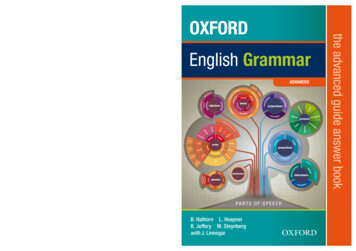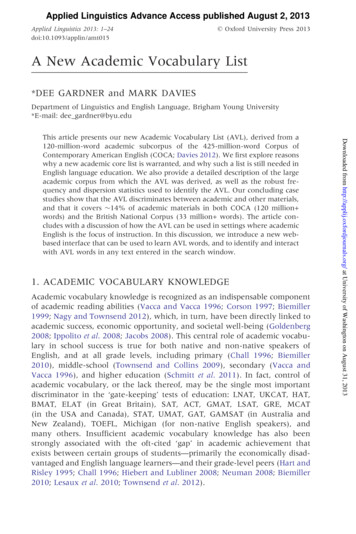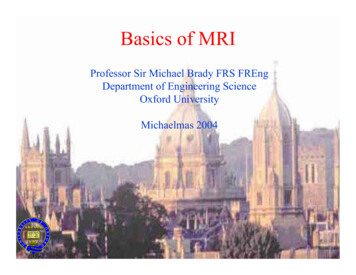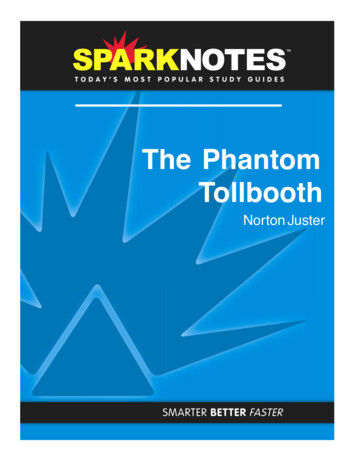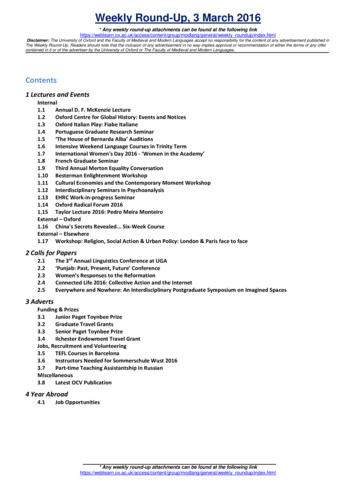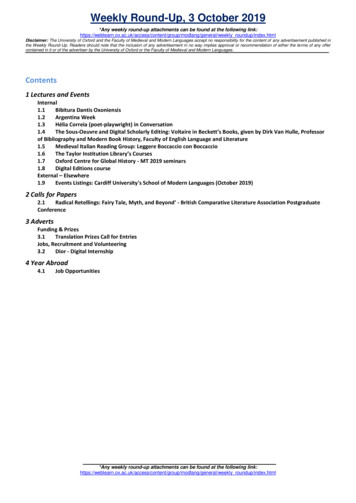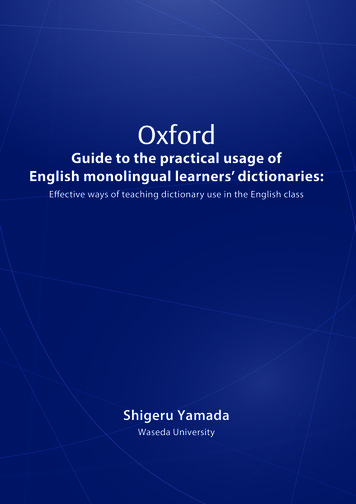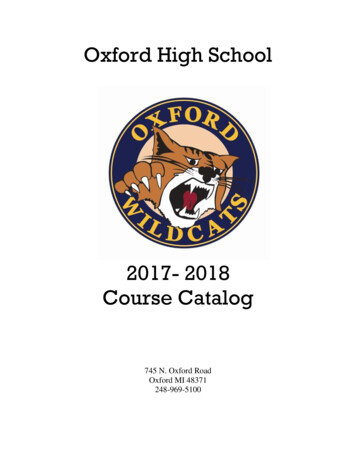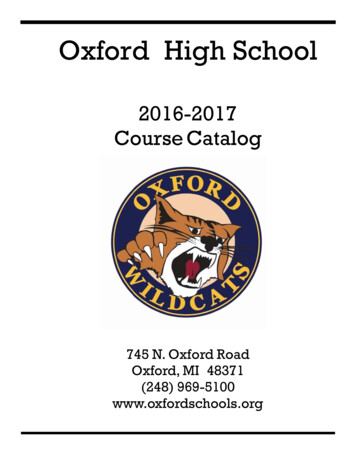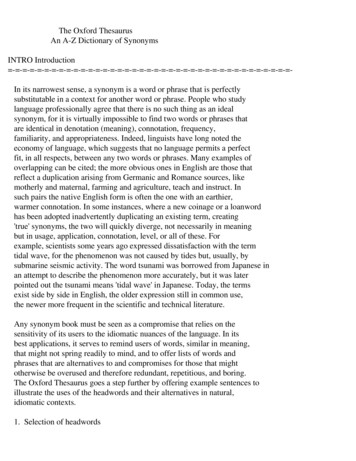
Transcription
The Oxford ThesaurusAn A-Z Dictionary of SynonymsINTRO Introduction - - - - - - - - - - - - - - - - - - - - - - - - - - - - - - - - - - - - - - In its narrowest sense, a synonym is a word or phrase that is perfectlysubstitutable in a context for another word or phrase. People who studylanguage professionally agree that there is no such thing as an idealsynonym, for it is virtually impossible to find two words or phrases thatare identical in denotation (meaning), connotation, frequency,familiarity, and appropriateness. Indeed, linguists have long noted theeconomy of language, which suggests that no language permits a perfectfit, in all respects, between any two words or phrases. Many examples ofoverlapping can be cited; the more obvious ones in English are those thatreflect a duplication arising from Germanic and Romance sources, likemotherly and maternal, farming and agriculture, teach and instruct. Insuch pairs the native English form is often the one with an earthier,warmer connotation. In some instances, where a new coinage or a loanwordhas been adopted inadvertently duplicating an existing term, creating'true' synonyms, the two will quickly diverge, not necessarily in meaningbut in usage, application, connotation, level, or all of these. Forexample, scientists some years ago expressed dissatisfaction with the termtidal wave, for the phenomenon was not caused by tides but, usually, bysubmarine seismic activity. The word tsunami was borrowed from Japanese inan attempt to describe the phenomenon more accurately, but it was laterpointed out the tsunami means 'tidal wave' in Japanese. Today, the termsexist side by side in English, the older expression still in common use,the newer more frequent in the scientific and technical literature.Any synonym book must be seen as a compromise that relies on thesensitivity of its users to the idiomatic nuances of the language. In itsbest applications, it serves to remind users of words, similar in meaning,that might not spring readily to mind, and to offer lists of words andphrases that are alternatives to and compromises for those that mightotherwise be overused and therefore redundant, repetitious, and boring.The Oxford Thesaurus goes a step further by offering example sentences toillustrate the uses of the headwords and their alternatives in natural,idiomatic contexts.1. Selection of headwords
Two criteria have been employed: first, headwords have been selectedbecause of their frequency in the language, on the assumption thatsynonyms are more likely to be sought for the words that are mostused; second, some headwords of lower frequency have been includedbecause it would otherwise be impossible to find a suitable place togroup together what are perceived as useful sets of synonyms withtheir attendant illustrative sentences. Obvious listings have beenomitted on the grounds that users of the Thesaurus can easily findsynonyms for, say, abdication by making nouns of the verbs listedunder abdicate. This deliberate attempt to avoid duplication ismitigated in the case of very common words. For the convenience of theuser, both shy and bashful are main entries, as are method, manner,and mode, which, though much the same in some respects, differ indetail and application. In this book, however, mitigate is a mainentry but not mitigation, mistake and mistaken are main entries butnot mistakenly, etc. Where it is determined that such derivations areneither automatic nor semantically obvious, separate listings havebeen provided.2. Illustrative sentencesOn the principle that a word is known by the company it keeps, one ormore sentences showing the main entry word in context are provided foreach sense discrimination. These have been carefully selected todemonstrate the use of the main entry in a context likely to beencountered in familiar written or spoken ordinary English. (See also7, below.)3. Synonym listsEach main entry is followed by one or more sense groupings, eachillustrated by one or more sentences. An effort has been made to groupthe synonyms semantically as well as syntactically and idiomatically:that is, each synonym listed within a given set should prove to bemore or less substitutable for the main entry in the illustrativesentence.In some instances, idiomatic congruity may, unavoidably, becomestrained; where it is felt to be stretched too far--though stillproperly listed among its accompanying synonyms--a semicolon has beeninserted to separate sub-groups of synonyms, and, in many cases,additional illustrative sentences have been provided. Suchsub-groupings have been confined largely to distinctions between
literal uses and figures of speech, between transitive andintransitive verbs, and between synonyms that differ in more subtleaspectual characteristics of meaning or syntax. (See also 7, below.)Not all senses of all words are covered for either or both of thefollowing reasons: the sense, though it exists, is relatively rare inordinary discourse and writing; there are no reasonable synonyms forit. Thus, this sense of mercy,an affecting or moving of the mind in any way; a mental statebrought about by any influence; an emotion or feeling: Mercyis an affection of the mind.is not covered for the first reason, as it is a literary and somewhatarchaic usage. The same can be said for the sense,a bodily state due to any influenceand for other senses listed in the largest dictionaries but rarelyencountered except in literary contexts. Even in such contexts itwould be unusual to need a synonym for this word and others like it.4. Cross referencesThere are very few cross references between main listings in theThesaurus. Where such cross references do occur, they are simple andstraightforward:superior adj.3 See supercilious, above. --n 4 Seesupervisor, below.A number of cross references occur within entries, between variantforms of an expression. At the entry for take, for example, as one cansay either take or take it in the sense of 'understand' etc., theoption is shown in the following way:take v.19 understand, gather, interpret, perceive,apprehend, deduce, conclude, infer, judge, deem, assume,suppose, imagine, see: I take him to be a fool. I take it fromyour expression that you've had bad news.33 take it: a withstand or tolerate or survive punishment orabuse, survive: The Marines are extremely tough and can take
it. b See 19, above.In a few entries, the form 'See also' is used.5. Labelsa. All words and phrases that are recognized as being typical of aparticular variety of English, whether geographical or stylistic,are labelled. It might at first seem that a large number ofcolloquial, slang, and taboo words have been included. The labelsused are those commonly encountered in ordinary dictionaries:Colloq Colloquial; informal; used in everyday conversation andwriting, especially in the popular press and in dramaticdialogue; sometimes avoided where more formal languageis felt to be appropriate, as in businesscorrespondence, scholarly works, technical reports,documents, etc.SlangBelonging to the most informal register andcharacteristic of spoken English; often originating inthe cult language of a particular socio-cultural group.Not sufficiently elevated to be used in most writing(aside from dialogue), although often found in thepopular press and frequently heard on popular radio andtelevision programmes.Taboo Not used in polite society, usually because of the riskof offending sexual, religious, or culturalsensibilities; occasionally encountered on late-nighttelevision and radio; often occurring in graffiti and indialogue in novels, plays, and films.Archaic Describing an obsolete word or phrase (like tickety-boo,lounge lizard) that is used deliberately to invoke thefeeling of a bygone time.Old-fashionedUsed of a synonym (like comfit) that is no longercurrent but might occasionally be encountered amongolder speakers and in older writing.Technical Used of a somewhat specialized word that is not commonly
encountered in ordinary, everyday English, likedefalcator, which appears as a synonym under swindler.Literary Describes a word, like euchre 'cheat', that is notusually met with in everyday language, even of theformal genre, but may be found in poetry and otherliterary works.Brit, US, Australian, Canadian, New ZealandMarks a word or phrase that occurs mainly in thedesignated variety.The meanings of other labels are self-evident.b. All labels can occur in combination. Usage labels always takeprecedence over regional labels. For example,pushover n. 1 sure thing, Colloq piece of cake, child'splay, snap, picnic, walk-over, US breeze, Slang cinch,Brit doddle, US lead-pipe cinch.Here 'sure thing' is standard universal English. All words andphrases following Colloq up to the Slang label are colloquial:'piece of cake,.walkover' are universal colloquial English,'breeze' is US colloquial. All synonyms following the Slang labelare slang; 'cinch' is universal English slang, 'doddle' isconfined to British slang, and 'lead-pipe cinch' is confined toAmerican slang.talented adj.Colloq ace, crack, top-notch, Brit wizard,whizzo, US crackerjack.In this entry, all synonyms shown are colloquial, 'ace, crack,topnotch' being universal English, 'wizard, whizzo' British, and'crackerjack' US.It must be emphasized that such labels are to some extentimpressionistic and are based in the Thesaurus on a consensus ofseveral sources: that is, there is no implication that 'breeze' isnever used in the sense of 'pushover' except in the US, nor shouldsuch an inference be made.c. Comments regarding what might be viewed as 'correct' in contrast
to 'incorrect' usage are generally avoided. For example, thenon-standard use of between in contexts referring to more than twoof anything or of among in contexts involving fewer than threegoes unmarked. However, if the usage question is confined to whatcan easily be represented in a 'lexical' environment, thensuitable treatment is accorded it; thus 'now' and 'at present' arelabelled Non-Standard under presently. To take another example,'different to', in the typically British usage His house isdifferent to mine, is rarely encountered in American English; inAmerican English, purists condemn 'different than', as in Hishouse is different than mine, which is increasingly heard inBritish English; purists on both sides of the Atlantic prefer'different from'. Such matters are best left to usage books and tousage notes in dictionaries and are not treated in the Thesaurus.d. Main entry words and sub-entries are not labelled, only thesynonyms. Thus, under beat appears the idiomatic expression, beatit, which is not labelled:8 beat it: depart, leave, abscond, run off or away, SlangUS take it on the lam, lam out of here, hit the road:You'd better beat it before the cops come.The idiom is not labelled because it is assumed that the user haslooked it up to find a substitute for it, hence needs noinformation about it other than a listing of its alternatives(which are labelled, when appropriate) and an illustrativeexample.A rare exception to the above rule occurs where a headword has onemeaning in British English and quite a different meaning inanother regional variety. Thus:subway n. 1 In US: underground (railway), tube: She takesthe subway to work. 2 In Britain: tunnel, underpass: Usethe subway to cross the road in safety.Here, the two regional labels do not apply to the synonyms (since,for example, 'tunnel' has the same meaning in both British and USEnglish) but to the two definitions of the headword.e. Synonyms bearing any kind of label appear at the end of the set inwhich they are listed, except in the case described immediately
above.6. Spelling and other variantsThe spellings shown throughout are those preferred by most modernBritish writers. British variant spellings are shown; if they arevariants of the main entry word, they appear as the first word in theset(s) of synonyms following:mousy adj. 1 mousey,.movable adj. moveable,.Such variants are also shown when they appear within an entry:movable adj.transferable or transferrable,.Common American spelling variants (humor, traveler, unraveled) are notshown, but less common ones are listed for convenience. Where bothforms are variants in American spelling, they are described by 'or USalso':.accoutrements or US also accouterments,.phoney or US also phony,.This should be understood to mean 'the normal British spelling isaccoutrements (or phoney); this form, together with accouterments (orphony), occurs in American English'.7. Substitutabilitya. The purpose of a synonym book is to provide the user with acollection of words that are as close as possible in meaning to adesignated word. The Oxford Thesaurus tries to go to a stepfurther by providing examples that not only illustrate the mainentry word in a natural contextual environment but also allow theuser to substitute as many of the synonyms as possible into theframework of the context. For example:porous adj. spongy, spongelike, permeable, pervious,penetrable: The rainwater runs through the porous rock andcollects in the pools below.It is possible to substitute for porous in the sample sentence any
of the words given as synonyms without any adjustment of thegrammar or phrasing of the example. That is not to suggest thatthe synonyms are identical: 'permeable' and 'pervious' belong to adifferent register from that of 'spongy, spongelike', being morecommon in technical usage. Some might argue that 'penetrable' isnot synonymous with the other listed words; but it is the functionof this book to provide synonyms for the main entries, not for theother synonyms that might be listed. No claim is made--nor couldit be made--that synonyms are identical, either to one another orto another word, merely that they fall well within the criteria ofwhat, for practical purposes, is viewed as synonymy in thelanguage.It is certainly true that substituting for porous any of the fivelis
it. b See 19, above. In a few entries, the form 'See also' is used. 5. Labels a. All words and phrases that are recognized as being typical of a
